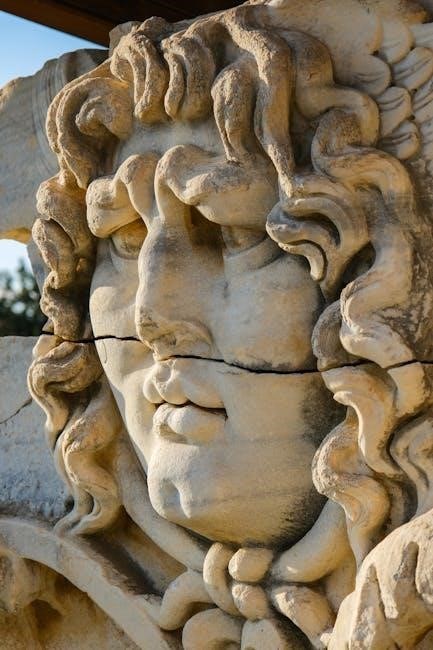Rick Riordan’s Percy Jackson and the Greek Gods reimagines classic myths through Percy’s witty perspective, blending humor with ancient tales․ The PDF version offers a modern twist, making Greek mythology accessible to new generations while staying true to its roots․
1․1 Overview of Percy Jackson’s Greek Gods
Percy Jackson’s Greek Gods is a captivating retelling of Greek mythology, narrated by Percy Jackson himself․ This unique twist blends humor and modern perspective, making ancient myths relatable and entertaining․ The book, available as a PDF, offers a fresh take on stories of Zeus, Poseidon, and other gods, presenting them in a way that resonates with contemporary readers․ By weaving his own voice into timeless tales, Percy transforms mythology into an engaging adventure, making it accessible to fans of all ages while staying true to the original legends․
1․2 Importance of Greek Mythology in Percy Jackson’s World
Greek mythology serves as the backbone of Percy Jackson’s universe, shaping his identity and quests․ The gods, their stories, and their influence are central to Percy’s adventures, dictating the challenges he faces․ By drawing from these myths, Riordan creates a world where ancient deities and modern life coexist, highlighting the relevance of mythology in understanding Percy’s journey․ This integration not only enriches the narrative but also allows readers to connect with timeless themes through a contemporary lens, making Greek mythology essential to the series’ appeal and depth․
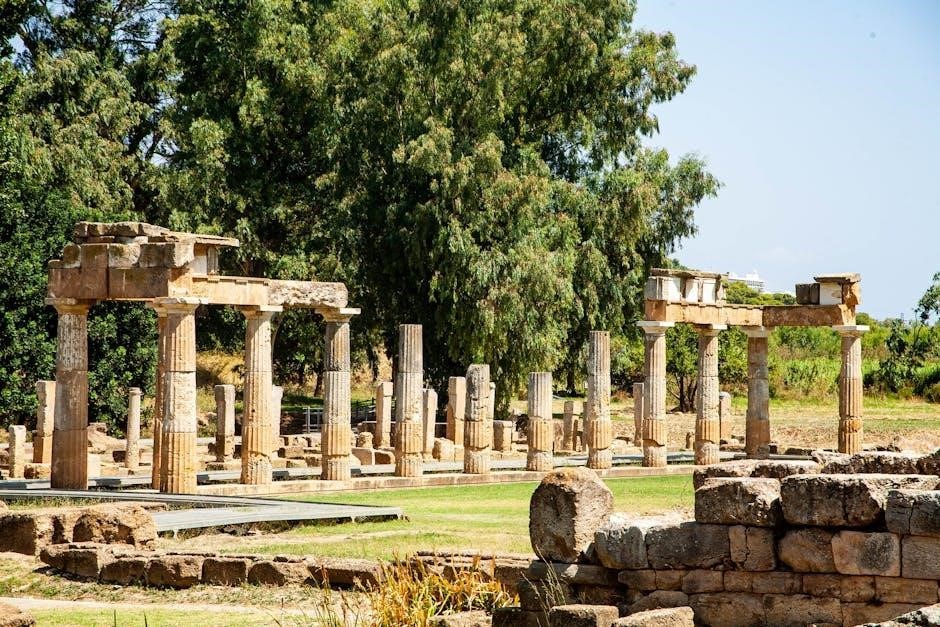
1․3 Why Percy Jackson’s Greek Gods is Popular Among Readers
Percy Jackson’s Greek Gods captivates readers with its unique blend of humor, relatable characters, and fresh take on classic myths․ Percy’s voice adds a modern, youthful perspective, making ancient stories feel approachable and engaging; The book’s ability to balance entertainment with educational value appeals to a wide audience, from young readers discovering mythology for the first time to adults seeking a nostalgic yet innovative retelling․ Its popularity is further boosted by its connection to the beloved Percy Jackson series, drawing in fans eager for more from the demigod world․
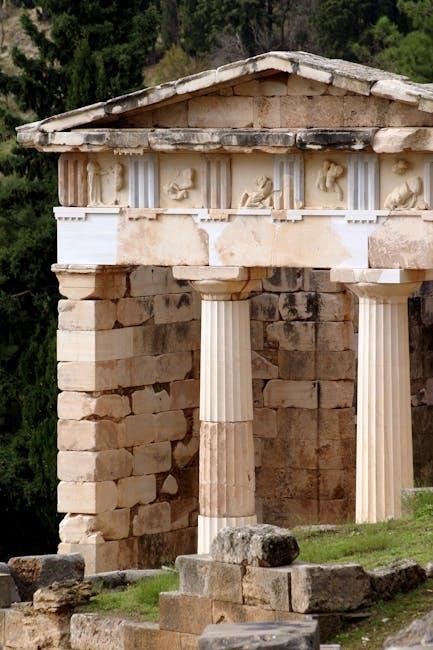
Percy Jackson’s Relationship with Greek Gods
Percy Jackson’s journey is deeply intertwined with Greek gods, whose divine influences shape his identity and quests․ His father, Poseidon, and other gods like Zeus and Hades play pivotal roles․
2․1 Percy’s Divine Parentage and Its Significance
Percy Jackson discovers he is the modern-day son of Poseidon, the Greek god of the sea, making him a demigod․ This divine lineage grants him extraordinary abilities and connects him to the world of Greek mythology․ His parentage places him at the center of prophecies and quests, as he navigates the challenges of being a child of the gods․ Percy’s identity is deeply influenced by his father’s legacy, shaping his role in battles between gods and monsters․
2․2 Key Greek Gods Featured in Percy Jackson’s Adventures
Percy’s adventures highlight gods like Zeus, the king of the gods, and Poseidon, his father, whose influence shapes his destiny․ Hades, the underworld ruler, plays a crucial role, as does Athena, whose wisdom guides Percy through challenges․ Apollo and Artemis feature prominently in quests, while Ares often opposes Percy․ Dionysus, Hermes, and Hephaestus also impact the story․ These interactions reveal the gods’ personalities and their modern relevance, making them central to Percy’s journey and growth as a demigod in a world where mythology meets reality․
2․3 Percy’s Interactions with the Gods and Their Impact on His Quests
Percy’s interactions with the gods are pivotal to his adventures․ His divine parentage as Poseidon’s son shapes his identity and challenges․ Zeus’s authority and Hades’s underworld connections often influence Percy’s missions․ Athena’s wisdom and Apollo’s guidance provide crucial support, while Ares’s antagonism creates obstacles; These interactions reveal the gods’ complex personalities and their modern relevance․ Percy’s ability to navigate these relationships determines the success of his quests, showcasing his resilience and growth as a demigod in a world where mythology and reality collide․
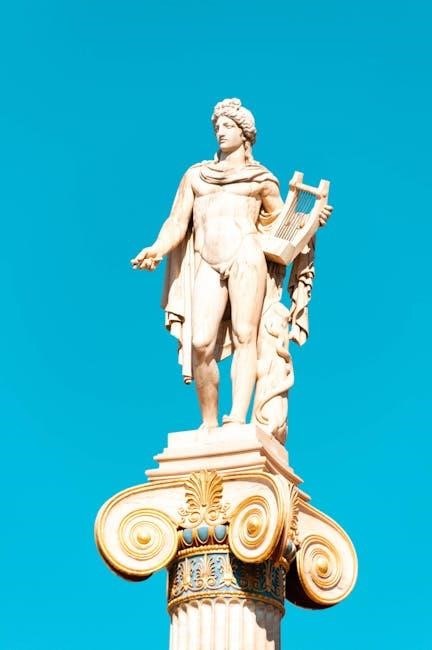
Other Notable Greek Gods in Percy Jackson’s Universe
Percy’s world includes a diverse array of Greek gods, each with unique roles and personalities․ From Aphrodite’s charm to Ares’s brutality, these deities shape Percy’s adventures and challenges, blending myth and modernity․
3․1 Zeus: The King of the Gods and His Role in Percy’s Life
Zeus, the mighty ruler of Mount Olympus, holds significant influence over Percy’s life․ As the king of the gods, his authority often puts Percy in precarious situations, especially when Zeus’s temper is unleashed․ Percy’s adventures frequently involve navigating the consequences of Zeus’s decisions, whether it’s controlling the skies or mediating conflicts among the gods․ Zeus’s complex character adds depth to Percy’s journey, blending fear and respect in a way that shapes the young hero’s destiny and challenges․
3․2 Poseidon: Percy’s Father and the God of the Sea
Poseidon, the powerful god of the sea, earthquakes, and horses, is Percy Jackson’s father․ His divine lineage makes Percy a demigod, granting him control over water and a deep connection to marine life․ Poseidon’s role as one of the Big Three (alongside Zeus and Hades) adds weight to Percy’s identity and quests; Despite his often-distant demeanor, Poseidon’s influence shapes Percy’s adventures, earning him both respect and challenges among other demigods and gods alike․
3․3 Hades: The God of the Underworld and His Connection to Percy
Hades, the god of the Underworld, rules over the dead, wealth, and certain natural phenomena․ As one of the Big Three, his power is immense, yet his interactions with Percy are complex․ Percy’s adventures often involve encounters with Hades, such as retrieving the Helm of Darkness․ While sometimes portrayed as a stern figure, Hades’ role in Percy’s quests highlights his significance in Greek mythology, blending antagonism and neutrality in Percy’s journey․
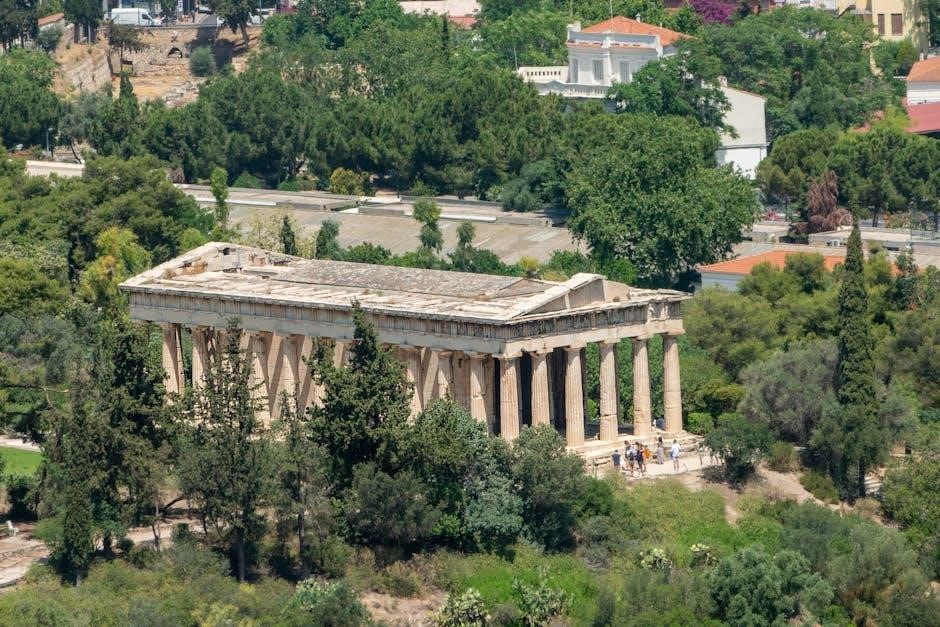
The Percy Jackson and the Olympians TV Series
The Disney+ series brings Greek mythology to life, with Percy Jackson discovering his divine heritage․ Walker Scobell stars as Percy, and Lance Reddick as Hades in this modern retelling․
4․1 How the Show Brings Greek Gods to Life
The series vividly portrays Greek gods with a modern twist, blending mythological essence with contemporary settings․ Gods like Zeus and Poseidon are depicted as powerful yet relatable figures, maintaining their divine aura while engaging in human-like interactions; Visual effects and character designs emphasize their mythical traits, such as Poseidon’s control over water, making the gods both formidable and familiar․ This approach captivates audiences, bridging ancient mythology with today’s storytelling․
4․2 Faithfulness to the Books and Fan Expectations
The Percy Jackson TV series strives to stay true to Rick Riordan’s books, addressing fan concerns after the movies’ missteps․ Key characters like Annabeth and Percy are faithfully portrayed, capturing their personalities and roles․ The show’s attention to detail in adapting iconic scenes and dialogue has resonated with fans, who appreciate the commitment to the source material․ By honoring the books’ spirit, the series aims to meet high expectations while introducing the beloved story to new audiences․
This faithfulness ensures the series remains authentic and engaging for long-time fans and newcomers alike․

4․3 New Characters and Their Representation of Greek Mythology
The Percy Jackson series introduces new characters that breathe life into Greek mythology’s rich tapestry․ Figures like Annabeth, daughter of Athena, embody wisdom and bravery, while Percy’s journey highlights gods such as Poseidon and Zeus․ The show’s casting of fresh actors brings modern energy to these ancient roles, blending tradition with contemporary charm․ These characters not only honor the myths but also offer new perspectives, enriching the narrative for both fans and newcomers․
This approach ensures the series stays vibrant and engaging while respecting its mythological roots․
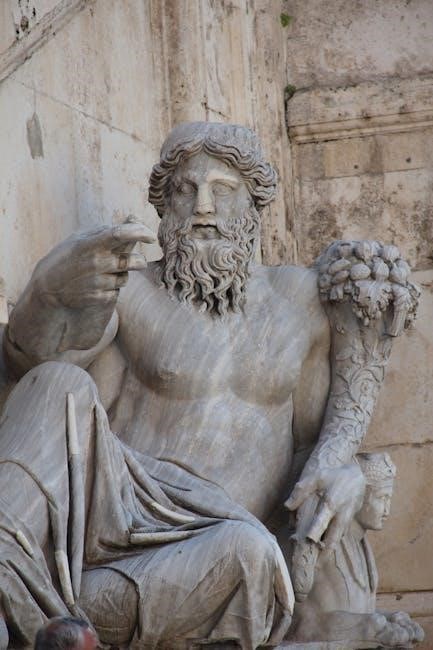
Educational Resources and Guides
Percy Jackson’s Greek Gods and related PDF guides offer engaging learning tools, blending mythology with modern storytelling; These resources make studying Greek myths fun and accessible for students․
5․1 Percy Jackson’s Greek Gods as a Learning Tool
Percy Jackson’s Greek Gods serves as an engaging educational resource, presenting mythological tales through Percy’s relatable voice․ The PDF version offers a structured format, making it ideal for classroom use․ Students can explore the pantheon of Greek deities, their roles, and stories, while the modern narrative style enhances comprehension․ This book bridges the gap between ancient myths and contemporary learning, fostering a deeper appreciation for Greek mythology in a fun and accessible manner for young readers and educators alike․
5․2 Available PDF Guides and Study Materials
Various PDF guides and study materials complement Percy Jackson’s Greek Gods, offering in-depth analysis and educational tools․ These resources include reading response questions, activity guides, and detailed character breakdowns․ Fans and students can access these materials online, enhancing their understanding of Greek mythology․ Additionally, the PDF format of Percy Jackson’s Greek Gods itself is widely available, providing a convenient way to explore the reimagined myths․ These resources are invaluable for both casual readers and educators aiming to integrate mythology into curriculum․
5․3 How to Use Percy Jackson’s Greek Gods for Mythology Studies
Percy Jackson’s Greek Gods serves as an engaging tool for mythology studies, offering a modern, relatable perspective on ancient myths․ Educators can use the book to introduce students to Greek mythology through Percy’s humorous narrative․ Activities include creating modern versions of myths, comparing Percy’s interpretations with traditional tales, and discussing moral lessons․ The PDF version is particularly useful for classroom discussions, allowing easy access to key stories and themes․ This approach fosters a deeper understanding of mythology while keeping students entertained and invested․
